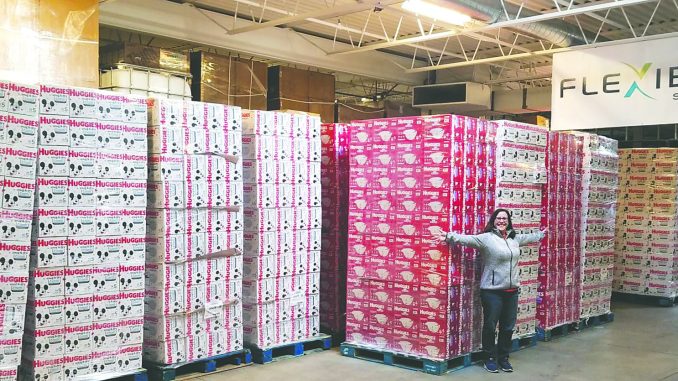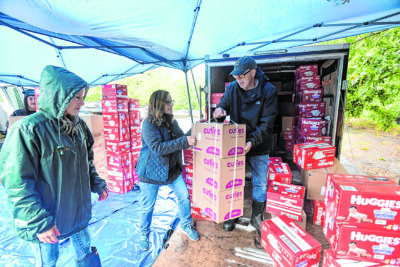
Allied Foundation diaper bank fills critical gap
One in two families with young children struggle to afford enough diapers. A newborn baby will use about 12 diapers a day, while a toddler will use around eight. Currently, there is no option for families to purchase diapers with any form of government assistance. Diapers cannot be purchased with SNAP or WIC benefits, which are primarily nutrition-based programs. This is why diaper banks like Allied Foundation are a critical lifeline for families who are struggling financially and cannot afford enough diapers.
The Allied Foundation was formed in 2015 by the pediatricians of Allied Physicians Group. These doctors wanted to come together because there were many families within their patient population who did not have access to diapers to keep their babies clean, dry and healthy. Because of this need, they made it their mission to form a diaper bank to make sure that families who are struggling to afford diapers had somewhere to go.
“We serve all of Long Island, as far east as Montauk, across Suffolk County all the way into Nassau. We do some work in Queens. We even did some work in Brooklyn and several of the boroughs during the pandemic. Since 2019, we have distributed 2.7 million diapers to families in need. We do that through a network of 65 different nonprofit community-based partnerships. These partners are in towns all across Long Island, and we work to ensure that they have diapers to distribute to the families who come to them for help,” said Heather Edwards, executive director for the Allied Foundation.
During COVID, the Allied Foundation stepped up to support an even larger area, including the five boroughs. This led to a record number of diapers distributed. “In 2020, we distributed a million diapers. COVID was a whole other animal. We were working with the contact tracing program for families who had COVID and were low income and needed additional support services. We sort of were a lifeline for them so they didn’t have to go out to their local CVS, walk down the street to get a package of diapers for their baby.”

(photos by Allied Foundation)
The Foundation is able to purchase diapers in bulk at a discount. They also accept donations of diapers from families whose babies have outgrown those sizes or are now potty trained. Edwards explained, “because we’re a member of the National Diaper Bank Network, we can purchase diapers in bulk at a very low cost through their proprietary diaper purchasing program. We also get donations from the Baby2Baby network and collect over 100,000 diapers annually from families whose babies have outgrown them.”
Families who cannot afford diapers sometimes go to extremes to stretch their limited supply. “In a lot of instances, they reuse soiled diapers. They will empty it as best as they can and then they put it back on the baby. They also have to keep their baby in (the same diaper) sometimes for 24 hours or longer,” Edwards said. This can lead to discomfort and rashes, which can become so severe that the baby has to be hospitalized.
These families are forced to choose between paying for diapers and paying for things like food, electricity, or personal care items. These kinds of choices take a toll on everyone’s mental health. “For moms and dads and other caregivers of babies, not being able to provide for your baby impacts the mental health for the whole family. Moms often forego a lot of things because they want to make sure they have diapers. It’s one of the most requested items at food pantries across the United States,” Edwards said.
Another factor is keeping their daycare supplied with diapers for their child. Edwards said, “a lot of people don’t realize that even subsidized daycare places, where some families pay on a sliding scale, (the parents) actually have to provide a 30-day supply of diapers. They need daycare to go to work, and even though they may pay very little because of their income level, they still have to provide a supply of diapers.” Providing that quantity of diapers at once can often be a struggle.
The Allied Foundation strives to make the process of meeting this need as simple as possible by partnering with resources that are already established in a given area. “If there’s an organization that’s already in the community that provides many resources such as job training, food and clothing, we partner together to make sure that families sort of have a one-stop shop where they can go to a trusted resource within their community and get everything they need.”
Because larger diapers and training pants are among the most expensive sizes, Allied also provides potty training resources to help families transition their children to the toilet sooner. The kit contains a portable potty seat with handles that fits on any toilet. There is also a potty book in either English or Spanish that also helps with literacy efforts. The third item is underwear, so the child can feel when they are wet in a way that diapers and often training pants are not designed to do.
In addition to diaper distribution, Allied has also begun giving out period products. “We distribute maxi pads and liners free of charge to those in need. The majority of our partners, if they’re coming to get diapers, they end up picking up maxi pads and liners as well. We currently don’t distribute tampons due to toxic shock syndrome. We don’t do menstrual cups or menstrual discs either, as they do require a bit of education,” Edwards said.
In support of a more sustainable option, the foundation is getting ready to start distributing washable, reusable period underwear. “We are going to be the recipient of a donation from Thinx, which is a period underwear company. We’re going to be getting a very large donation in October that we’re going to be then distributing out through all of our partners,” Edwards said. They are also looking into biodegradable diapers.
For more information about the Allied Foundation, the Allied Foundation Diaper Bank and ways to donate or volunteer, please visit their website, https://alliedfoundation.org/give/donate-diapers/.

Be the first to comment